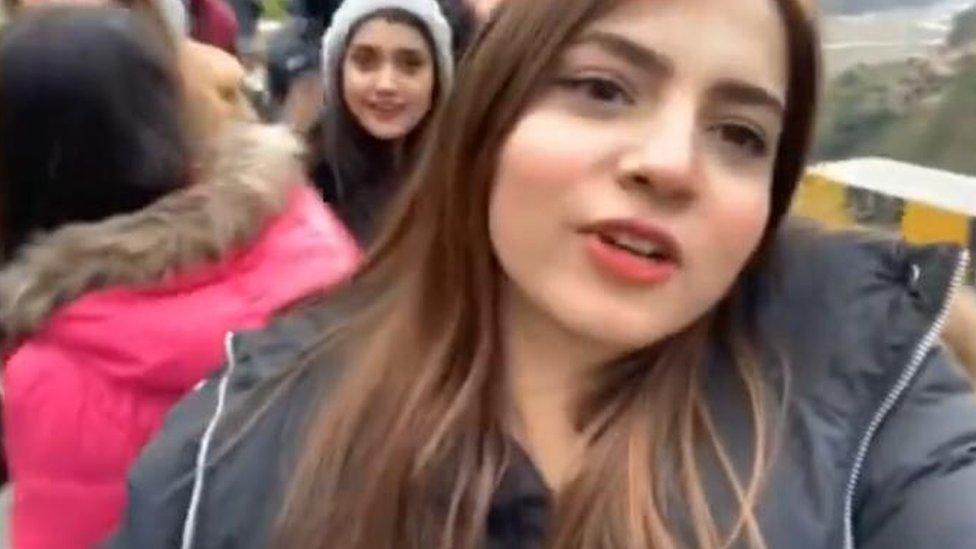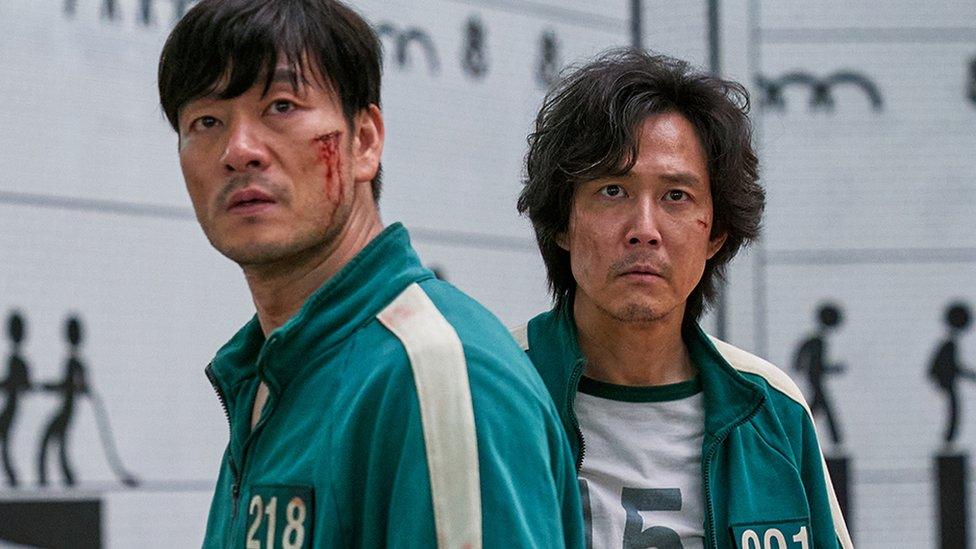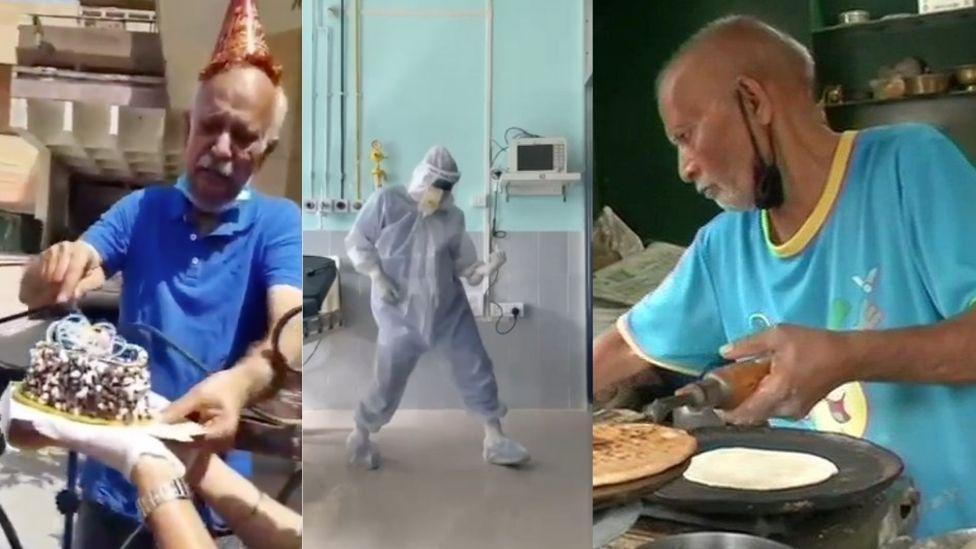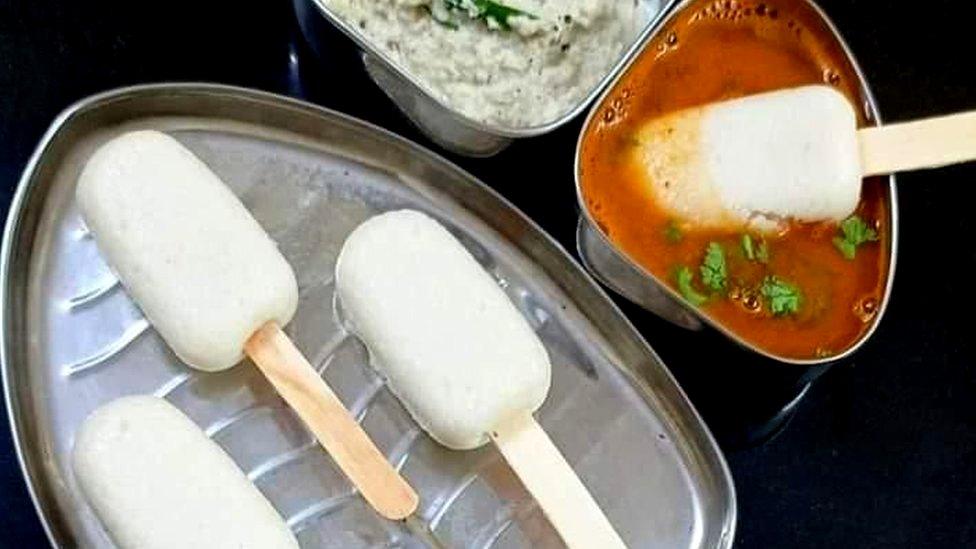2021 viral videos: The social media moments India celebrated
- Published

Dananeer Mobeen's "pawri" video went viral in India and Pakistan
It has been a difficult year yet again - fears of a third Omicron-fuelled Covid wave are rising, just months after a devastating second wave. But there were some social media moments that were celebrated even amid the gloom.
Here are five moments that gave people hope in 2021.
The five-year-old Covid 'warrior'
In April and May, a deadly second wave of coronavirus infections swept through India, disrupting the healthcare system. At its peak, on 6 May, India reported 414,000 new infections.
But as daily case counts fell and state governments eased curbs, tourists flocked to popular vacation spots.
In July, the government urged people to follow Covid protocols after videos showed mask-less crowds of tourists.
Around that time, this video, shot in a crowded market in Dharamsala town in the northern state of Himachal Pradesh, went viral.
Allow Instagram content?
This article contains content provided by Instagram. We ask for your permission before anything is loaded, as they may be using cookies and other technologies. You may want to read Meta’s Instagram cookie policy, external and privacy policy, external before accepting. To view this content choose ‘accept and continue’.

In it, Amit, five years old and barefoot, holding a bottle in one hand and a stick in the other, lightly taps people who aren't wearing masks and demands that they do so.
The recipients of his attention look startled or amused - one even pats his chin. But local police were impressed - they bought him shoes and snacks, and said they would make him a mascot for coronavirus awareness.
According to reports, locals also promised to help the boy, who sold balloons to help his parents earn a living.
When India and Pakistan 'pawri'ed together
In February, when Pakistani social media influence Dananeer Mobeen shared a five-second video on Instagram, she had no idea she was about to become a cross-border pop culture star in India and Pakistan.
Allow Instagram content?
This article contains content provided by Instagram. We ask for your permission before anything is loaded, as they may be using cookies and other technologies. You may want to read Meta’s Instagram cookie policy, external and privacy policy, external before accepting. To view this content choose ‘accept and continue’.

Ms Mobeen, 19, gestures to a car and her friends as she swings around the camera, saying - "This is our car, this is us, and we are having a party".
She uses the English word for "party" but pronounces it "pawrty".
The post's caption explains that she's poking fun at "burgers" - a term used by Pakistanis for rich elites who studied or worked outside Pakistan and speak with an American or British accent. Burger here denotes a fancy foreign product, like the expensive food item when it first came to Pakistan, as opposed to the local version, the humble bun kebab.
The video first went viral in Pakistan, external but India soon joined the "pawri" after an Indian music producer remixed the clip to catchy beats.
Allow Instagram content?
This article contains content provided by Instagram. We ask for your permission before anything is loaded, as they may be using cookies and other technologies. You may want to read Meta’s Instagram cookie policy, external and privacy policy, external before accepting. To view this content choose ‘accept and continue’.

It went viral and hundreds of people, from Bollywood stars to Indian soldiers, shared their own versions of the video.
Even brands jumped on the bandwagon and the internet exploded with memes.
Allow Instagram content?
This article contains content provided by Instagram. We ask for your permission before anything is loaded, as they may be using cookies and other technologies. You may want to read Meta’s Instagram cookie policy, external and privacy policy, external before accepting. To view this content choose ‘accept and continue’.

Allow Instagram content?
This article contains content provided by Instagram. We ask for your permission before anything is loaded, as they may be using cookies and other technologies. You may want to read Meta’s Instagram cookie policy, external and privacy policy, external before accepting. To view this content choose ‘accept and continue’.

In Pakistan, the national cricket board shared a video of the team shooting their own versions after winning a series against South Africa.
The BBC wrote at the time that the video cheered people up in two countries "who are usually at odds on most things because of the decades of sometimes deadly animosity".
And Ms Mobeen was happy about her role.
"What could be better than sharing love across the border at a time when there is so much trouble and so much division around the world," she told BBC Urdu.
India's first Covid jab
When India began the world's largest vaccination drive in January, the first person to receive a jab was a sanitation worker.
Allow X content?
This article contains content provided by X. We ask for your permission before anything is loaded, as they may be using cookies and other technologies. You may want to read X’s cookie policy, external and privacy policy, external before accepting. To view this content choose ‘accept and continue’.

Manish Kumar, 34, works at the All India Institute of Medical Sciences in the national capital, Delhi.
"I had a very nice experience. I was not reluctant to get the vaccine shot... people need not be worried," Mr Kumar told ANI news agency.
The choice was seen as symbolic of India's intentions to ensure its frontline workers were prioritised during the vaccine drive.
Sanitation workers often work in appalling, unhygienic conditions without much protective gear or social support.
In a televised address that day, Prime Minister Narendra Modi spoke at length about doctors, nurses and other frontline workers "who showed us the light" in "dark times".
The country's vaccination drive later ran into hurdles - due to production shortages and glitchy technology, among other factors - but on 16 January, Mr Kumar was a face of hope for the programme as he took the jab among cheers.
India's first athletics gold at the Olympics
Neeraj Chopra threw 87.58m in the men's javelin to win India's first ever Olympic athletics gold in August.
It was a historic moment that Indians celebrated.
Chopra became only the second Indian to win an individual gold after Abhinav Bindra in Beijing in 2008.
A video of his best throw at the event went viral, showing Chopra coolly raising his arms in triumph without even checking to see where the javelin had landed.
Allow X content?
This article contains content provided by X. We ask for your permission before anything is loaded, as they may be using cookies and other technologies. You may want to read X’s cookie policy, external and privacy policy, external before accepting. To view this content choose ‘accept and continue’.

"It feels unbelievable," Chopra said. "It's a proud moment for me and my country."
Like India's other medal winners - the country registered its best ever Olympic haul at Tokyo - Chopra returned home to a hero's welcome.
The 'Rasputin Challenge'
In April, two young medical students from the southern state of Kerala took time out from their busy schedules to dance to Boney M's 1978 disco-hit Rasputin, wearing blue scrubs.
The 30-second Instagram reel by Janaki Omkumar and Naveen Razak, shot in the empty corridors of their college, went viral, garnering millions of views.
Allow Instagram content?
This article contains content provided by Instagram. We ask for your permission before anything is loaded, as they may be using cookies and other technologies. You may want to read Meta’s Instagram cookie policy, external and privacy policy, external before accepting. To view this content choose ‘accept and continue’.

The duo's confident moves and Mr Razak's eyebrow flourish at the end drew plenty of praise.
But the two also came in for some hate after a Facebook post remarked on their different religions - the post also cautioned Ms Omkumar's parents about Mr Razak as he is Muslim and she is Hindu.
While the two are friends, interfaith couples often face resistance from their families and communities - right-wing Hindu groups even peddle a conspiracy theory alleging that Muslim men seek to make Hindu women fall in love with them with the sole purpose of converting them to Islam.
But Ms Omkumar and Mr Razak received a lot of support - students unions in other colleges invited people to shoot their own versions of the dance, and several medical students shared videos of their own moves.
Allow Facebook content?
This article contains content provided by Facebook. We ask for your permission before anything is loaded, as they may be using cookies and other technologies. You may want to read Meta’s Facebook cookie policy, external and privacy policy, external before accepting. To view this content choose ‘accept and continue’.

In one version, friends of Ms Omkumar and Mr Razak danced to the song, with the two joining them at the end - the caption said "if you intend to spread hate, we plan to resist".
College hallways turned into dance floors as students flooded social media with their own videos using #stepagainsthatred.
- Published15 October 2021

- Published31 December 2020

- Published1 October 2021
